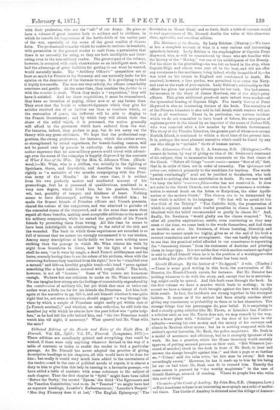The Athanasian Creed. By C. A. Swainson, D.D. (Rivington.)—We cannot
do better, by way of giving an idea of Dr. Swainson's treatment of his subject, than to summarize his comments on the first clause of the Creed. "Before all things "—ante omnia—mean "first of all," first, that is, in order of time, not in order of necessity. The Quicunque wile salmis esse, referred primarily to the candidate for baptism. The words "perish everlastingly" need not be justified to Secularists, who look forward to nothing else than annihilation in death. No one can be said "to keep the faith "—servare fides:—who has not received it. It does not refer to the Greek Church, nor even does it "pronounce a condem- nation to eternal death on the Arian or Eutychian, the older Apolli- narian or the modern Greek." The clauses are to be interpreted by that which is mildest in its language. " He that will be saved let him thus think of the Trinity." " The Catholic faith, the preservation of which is enjoined under such fearful penalties in clause 2, cannot be identical with the belief recommended so gently in clause 28." And, finally, Dr. Swainson "would gladly see the clause removed." Yet, after all possible explanations, subtle, even convincing as they may seem at the time, we come back to the words themselves, and find them as terrible as ever. Dr. Swainson, of whose learning, liberality, and candour we cannot speak too highly, gives us at the end of his book a revised translation and new arrangement. One can hardly help smiling to see that the practical relief afforded to our consciences is separating the " damaatory clauses " from the statement of doctrine and printing them in large type. It is not unlike that which another eminent apologist is said to afford himself when he is in the position of a worshipper—the not finding his place till the second clause has been read.






























 Previous page
Previous page